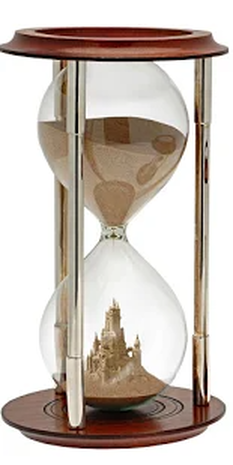 I would be remiss if I didn't include a blog post on one of my weirdest specialties: colorful meditations with dead composers. So I leave you with this final blog post on the motet puppet show, at least for the time being. I sat down to try a meditation conversation with Johann Sebastian Bach and asked what he might have to say on creativity, productivity, and the motets. Here are the results. I see a watering can held by an unseen hand slide through the crown glass window to give the flowers in the window box a drink. To my left is a large wooden door, so I knock. Mr. Bach opens the door and beckons me to come in. Then I see the owner of the watering hand, and it’s Anna Magdalena! She’s smiling and very welcoming. I find myself inside a cozy cottage beside a milk jug full of flowers. I sit on a carved wooden bench facing Anna and Johann who sit in their own chairs beside a crackling fire. Anna picks up her knitting and Johann starts puffing on his pipe. “Thank you so much for inviting me in to speak with you,” I say, “While I called upon Johann, it’s marvelously unexpected to meet you too, Anna!” She giggled, “This American habit of calling people by first name is certainly strange!” I realize it’s strange too to call Bach “Johann" considering all his relatives were named Johann, but that’s what my mother called him, so it stuck. “You wanted to talk to me about something,” Johann says. “What specifically do you have in mind?” “As you know I’m working on a shadow puppet show to go along with your motets, so I wanted to see if you had anything to share with the public about the motets, or creativity, practice, and productivity. I mean, really anything you have to say would be amazing!” 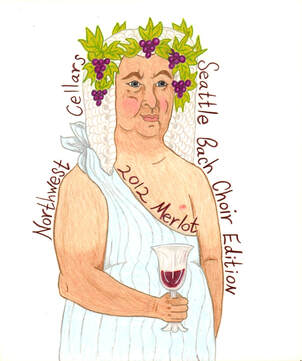 A wine label I designed for a Seattle Bach Choir fundraiser. He wasn't wearing a toga in this meditation, but this is kind of how I see him. A wine label I designed for a Seattle Bach Choir fundraiser. He wasn't wearing a toga in this meditation, but this is kind of how I see him. Anna lit up, “A puppet show! Oh, that sounds very exciting!” Johann puffed on his pipe thoughtfully without saying a word. I kind of wondered where all the children were, but of course they had all grown up a long time ago. I had another curiosity as well. Often when I reach out in meditation to certain personalities they have large castles built upon their desires and concepts of their own self worth. Why was I in a cottage? I asked Johann if he had a castle and why we weren’t there, not that I would rather be in a castle, I was just curious. “We thought this would give you a more welcoming, homey feeling,” he said. True enough. Johann then took a big drag on his pipe and blew out a cloud of smoke which held a picture. Within the cloud was a racing horse, but standing completely still in mid gallop. The edges of the horse were streaking, with gaps between the lines. The horse, paused in motion, appeared to be an incomplete specter. “The funny thing about music is that it is an ungraspable art form,” Johann explained. “It speeds by, but it leaves gaps. It is never complete. Music is only ever completed in the listener’s mind, and we all complete it differently.” He got up and led me to another room, the music room. On my right a viola da gamba lay on its side on the floor. On my left was a harp beside a couple of bookshelves, and before me was a red oriental carpet and a gray harpsichord outlined in gold. Johann sat at the harpsichord and began to play one of his fastest pieces from the Well Tempered Clavier Book 1: the prelude in C minor. It became the horse, running for me in shades of indigo blue, slate gray, and mustard yellow. Johann then got up and went to one of the bookshelves. He handed me a large book bound in mauve silk, but I didn’t open it just yet. "Seems to me that any art form that makes use of time is ungraspable,” I said, “all performance art certainly, but maybe even visual art and written art. We all perceive based upon our own experiences and mindset.” “Yes, art comes to life only within the observer. The best we can hope for as artists is that we can inspire others,” Johann said sounding strangely like John Cage. I opened the book and saw another illustration of a horse in pen and ink. The horse stood within its stable as a farm girl offered it an apron full of hay. Johann explained. "As artists though we must feed our audience good food. Horses have a limited diet. That’s why they don’t compose sinfonias.” I snickered. “Tell me about your motets. I find it interesting that they were the only pieces of yours that were consistently performed after your death.” “That’s because they’re functional. People care much more for function than for art.” He then sat back down at the harpsichord and began playing Komm, Jesu, komm. A slight smile formed upon his face, like he was reliving a beautiful memory. “How did you feel about your motets?” I asked. “Did you like what you created?” “I’ll tell you this. It doesn’t matter what I think of them. Does it matter how the giver feels about the gift he gives another? What matters only is how the receiver feels about it. When we belittle our own art we must be mindful that there is always someone less advanced who may be discouraged by that.” I nodded in agreement. I know it bothers me when one of my artistic heroes hates their own work. If that’s the case then they must surely hate my work too! 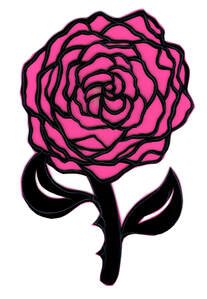 A rose puppet from Lobet den Herrn cut from adhesive vinyl and attached to a pink gel. You can even see the pencil lines. A rose puppet from Lobet den Herrn cut from adhesive vinyl and attached to a pink gel. You can even see the pencil lines. “I have another more personal concern,” I said. “Once I perform this show I may not be able to put on another large scale puppet show for a long time. I’ll be losing my rehearsal space, and these productions take so long to create I can never make enough money from them to make it out of poverty. But at the same time I’m going to gain momentum from this show. I don’t want to waste it. What do I do with that momentum?” Johann showed me a sled sitting at the top of a snowy hill, a very steep hill. My heart was in that sled feeling trepidation about going down that hill, but I did. Going down hill allowed me to gather up the speed required to float up the next hill effortlessly. I then sat upon that next hill feeling that same fear about going down the other side. This message was more felt than heard. I can use that momentum in any way that feels right at the time. It doesn’t have to be put into another large scale puppet show, or even a puppet show at all. The hardest part though is pushing yourself down that hill to start gathering the momentum needed to overcome your obstacles, but I’m doing it. It’s all about having the bravery to start something in the first place. I began to open my eyes, but Johann called me back saying he had something else to say. I saw an hourglass, but it was shaped differently, like two pyramids on top of one another point on point. Johann took a bag of sand and started pouring it into the hourglass. “You can always add more sand,” he said. “Come on, you can’t just add time,” I quibbled. “But you can! Time isn’t real, and above all it is what we make of it.” “I don’t know how much of that I can understand, but I do know this...” I said as I reached into the hourglass. I built a little sandcastle, destroyed it, then built another. “This must be what music is: to build sandcastles in the hourglass.”
0 Comments
Leave a Reply. |
AuthorHi, Juliana Brandon here. This is where I let you peek behind the scenes here at Paper Puppet Opera. See works in progress, rehearsal snippets, and learn more about the history behind each production. Archives
March 2023
Categories |
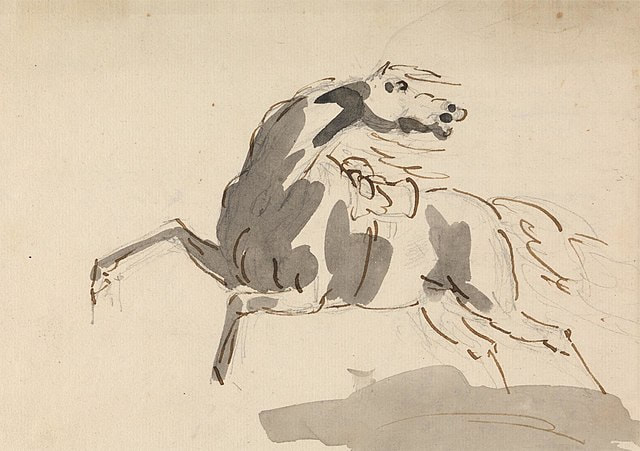
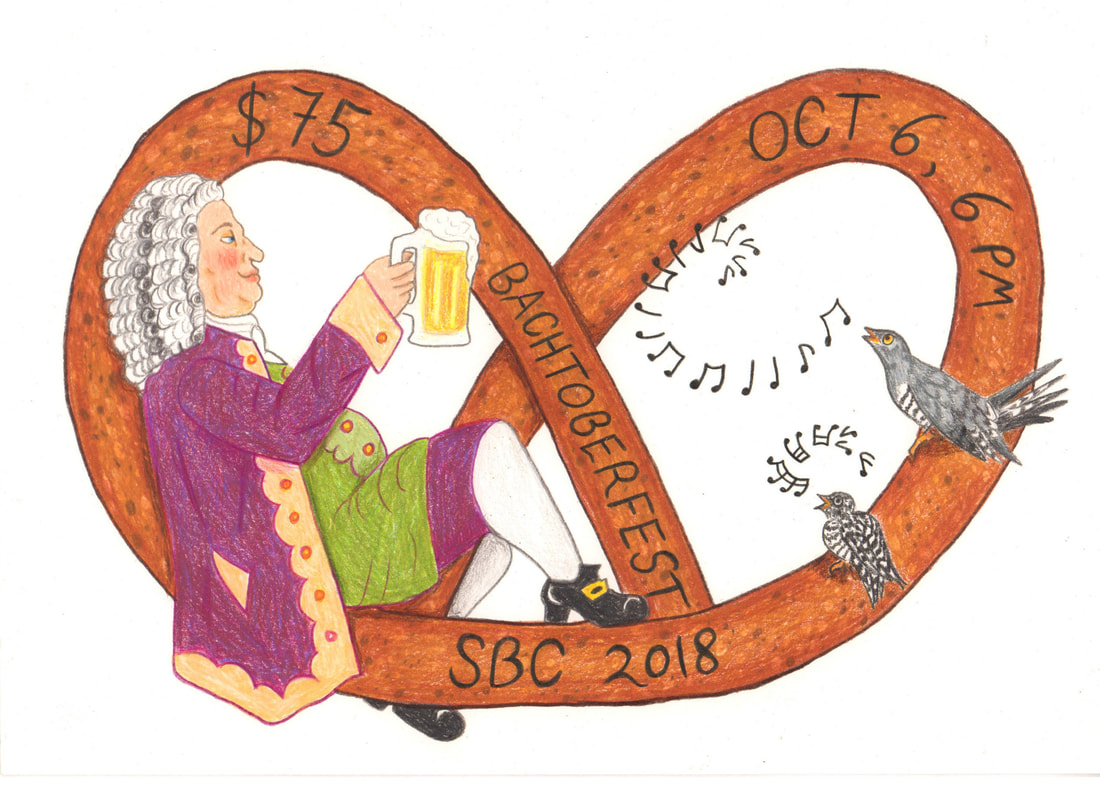
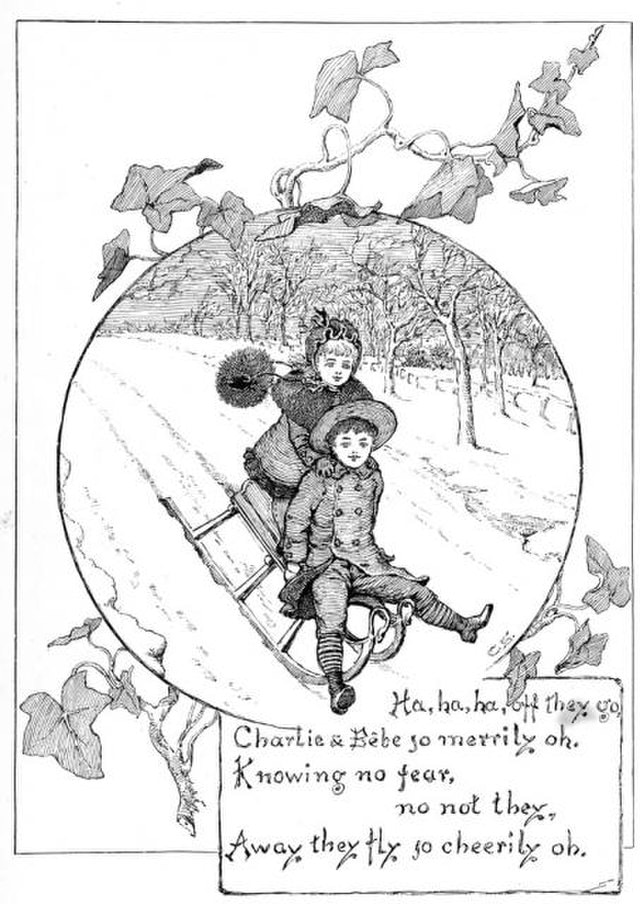
 RSS Feed
RSS Feed